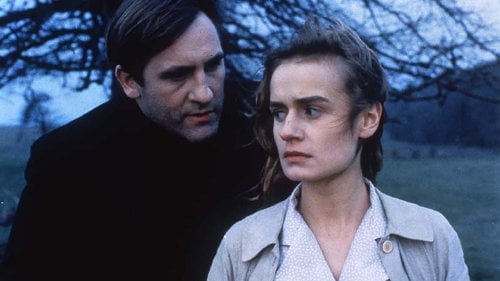Under the Sun of Satan

Father Donissan (Gérard Depardieu) is a hulking, under-educated rural priest anguished by his inability to gain the love of parishioners and identify God's plan. He mortifies himself with hair shirts and flagellation in order to get closer to God. Frustrated, yet seeing something in this younger man, his superior, Father Menou-Segrais (director Maurice Pialat), sends him on an errand, but he loses his way and has two fateful encounters that cast him "Under the Sun of Satan."
Laura's Review: A-
This controversial 1987 Palme d'Or winner, which was famously booed at Cannes, has been difficult to see until last year's traveling Pialat retrospective. Now available for the first time in the U.S., Cohen Media's blu ray presents it in a 2K restoration. It is a harrowing and insightful adaptation (by Pialat and his wife Sylvie) of Georges Bernanos's 1926 novel (Bernanos also wrote "Diary of a Country Priest" and "Mouchette," both adapted by Robert Bresson). Depardieu has never been better than he is here displaying the physicality of a laborer and the countenance of a troubled soul. When we first meet him, he is having the crown of his head shaved by Menou-Segrais as he confesses that he hears a continual stream of sin from their flock, but cannot help them, only weep. There is a canny bit of editing by Yann Dedet ("Loulou," "À nos amours") to transition from Donissan's story to Mouchette's (Sandrine Bonnaire, luminous). As the priest celebrates Communion, he looks out over his parishioners. 'It's me!' says Mouchette, entering a room. But she is not in the Church. She is visiting her married lover Cadignan (Alain Artur, 1988's "Chocolat"), her peevish response to his refusal to marry her that she will soon become the mistress of Dr. Gallet (editor Dedet). She grabs a rifle and, from behind an open door, we hear a blast - she has shot him and is hysterical. Later, she confesses to Gallet, saying she did not know the gun was loaded, but he does not believe her, Cadignan's death having been ruled a suicide. She also asks him to terminate her pregnancy, but he refuses. On the road, Donissan is shown by Pialat walking alongside a dray horse, two burdened beasts. Tiring, he meets an itinerant horse trader (Jean-Christophe Bouvet, "La France") who offers a short cut, then the offer of a hut to rest in. But the man, who at first seems a homosexual predator, is Satan himself and he tells the priest he is now marked before vanishing. Back on the road, Mouchette's introduction is echoed. 'Oh, it's you,' she says meeting the cleric who uncannily knows everything about her. Back at the parish, reporting on his failed mission to Menou-Segrais, Donissan tells him 'God twice let me see through a body to a soul.' Fearing that Mouchette's 'temptation may be greater than her crime,' he rushes to her home, but is too late. His reaction to her suicide is a scandal, Pialat depicting a far darker Communion than the one which was celebrated right before we met Mouchette. Finally, the sins of humanity prove too much to bear for the holy fool who does not know which master he serves. Pialat's direction borders on staginess, the literariness and performances in his work of paramount importance. Cinematographer Willy Kurant ("Masculin Féminin") frames the actors so that the hulking Depardieu or birdlike Bonnaire always draw our eye, a contrast of darkness and light. The film is mysterious and powerful. Pialat, an atheist, has made a deeply spiritual film in the canon of Dreyer and Bresson, Bruno Dumont's "Hors Satan" surely influenced by it. The blu ray: In addition to the stunning restoration, there is a second disk packed with over two hours of extras. In an interview with Depardieu, in which he almost melts into the couch he's sitting on, the actor describes his 'true love' with Pialat and reads from Bernanos' text. Cinematographer Kurant describes Pialat's often confounding methods, stating that he believes he never worked with him again because he dared to shoot a movie for another filmmaker in Pialat's home town. Set designer Katia Wyszkop describes her terror on what was only her second movie shoot and how she came to be charmed by the man who initially frightened her. We learn that he followed Visconti's method of creating immersive sets where even drawers were filled. The most impressive extra is titled 'Deleted Scenes,' but this is not just a series of clips. Instead, it's like a commentary track to an alternate version of the movie with editor Dedet, scenarist Sylvie Pialat and assistant editor Cédric Kahn. That ingenious transition to Mouchette and its counterpart when she meets Donissan might never have happened had all the explanatory scenes, like one in which we see Cadignan load his gun, not been scrapped. We also see Bonnaire act with Claude Berri, originally cast as Gallet. In Behind the Scenes Footage, Depardieu has trouble keeping a straight face as a bull lows in the background. Also included are the film's original theatrical trailer as well as the new one prepared for its rerelease. Grade:

